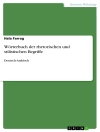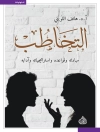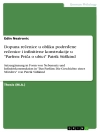These two volumes offer a selection of the papers held at the conference of the International Association for Dialogue Analysis (IADA) in 2003. Volume I contains 38 articles devoted to dialogue and the phenomenon of ‘dialogicity’ in literature, ranging from antiquity to a large number of modern languages and literatures. The conversation-analytic approaches drawn upon are notable for their methodological diversity. This is also true of the 32 articles in Volume II. The main focus here is on present-day types of dialogue in the new electronic media and their ‘traditional’ counterparts (press, radio, television, film). The examples are taken from various countries, and they are discussed in terms of the intercultural, semiotic, translatorial, and general pragmatic issues they pose.
قائمة المحتويات
Contents: I. Plenaries: Monika Schmitz-Emans , Literary multilingualism as construction of dialogicity. – Anne Betten , Zur Dialogtechnik Thomas Bernhards. – II. Workshops: 1. Indirectness in literary dialogue: Edda Weigand , Literary action games: Expressing the inexpressible. – Elda Weizman / Marcelo Dascal , Interpreting speaker’s meanings in literary dialogue. – Donna Shalev , Economy of information in ancient Greek comic dialogue. – 2. Discourse analysis in literary studies: Ernest W.B. Hess-Lüttich , Literarische Gesprächsformen. – Gesine Schiewer , Verbales Verhalten im Horizont von Ethologie und Psychologie. – Luise Liefländer-Koistinen , Diskursanalyse und Übersetzen. Die Rolle von Modalpartikeln. – 3. Der Bousoño-Ansatz: Genera Pulido Tirado / Angelika Theile-Becker , Das dialogische Fundament der Theorien von Bousoño. – Angelika Theile-Becker , Rhetorische Verfahren und Sprachspielzüge im Theater von Francisco Nieva. – III. Individual Papers: 1. Dialogue and Dialogicity in Prose: Matti Luukkainen , Zur Veränderung der Dialogstruktur und Redegestaltung in den Texten von Christa Wolf. – Régine Battiston , Funktion der Dialoge in Max Frischs Romanen. – Barbro Landén , Dialog im epischen Kontext. – Johannes Schwitalla , Sprach- und Dialoggestaltung in Andreas Maiers »Wäldchestag«. – Carmen Licari , Sur quelques choix stylistiques de Flaubert à Sarraute. – Sara Cigada , L’expression des émotions dans »La Princesse de Clèves«. – Adina Abadi , Conversational arguments in the novel »A Late Divorce« by Yehoshua. – Silvia Bruti , Ways of describing social chatter in Austen’s novels. – Maria Langleben , Personal pronouns and metamorphoses of persons. – Thierry Gallèpe , Didaskalien bei der Dialogdarstellung in Erzähltexten. – Tatiana Slama-Cazacu , Dialogue in monologue in Paul Goma’s prose. – Henning Westheide , Dialogische Aspekte monologischer Texte. – Roberta Lorenzetti / Marina Mizzau , Dialogic aspects of stream of consciousness in autobiographical memory re/construction. – Georg Weidacher , Kommunikation kafkaesk. – Arturo Larcati , Die >dialogische Wende< in der deutschen Literatur der Nachkriegszeit. – Olga Tchesnokova , Laura Esquivel’s »Como agua para chocolate«. – Eva-Maria Thüne , Zur literarischen Darstellung von Telefonkommunikation. – 2. Dialogue and Dialogicity in Drama: Sophie Roesch , Le connecteur iam dans les dialogues de Plaute. – Mirka Maraldi / Anna Orlandini , Réactions adverbiales dans la comédie latine. – Gabriella Del Lungo Camiciotti , Metanarrative frame and evaluation in late medieval saints’ lives. – Jean-Paul Dufiet , L’énonciation chorique. – Kate Dorney , The performative nature of metalinguistic dramatic dialogue. – Judith Munat , Routines, rituals and patterns. – Cornelia Ilie , Interruption patterns in parliamentary debates and in drama dialogue. – Ludmilla Kastler , Le dialogue dans le théâtre russe moderne. – Alice Spitz , Conflict talk in contemporary plays by women. – Lenke Németh , Dialogic patterns in two Adrienne Kennedy plays. – Daniela Pirazzini , Dialoge in zwei Sprachen.












